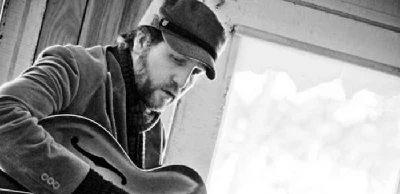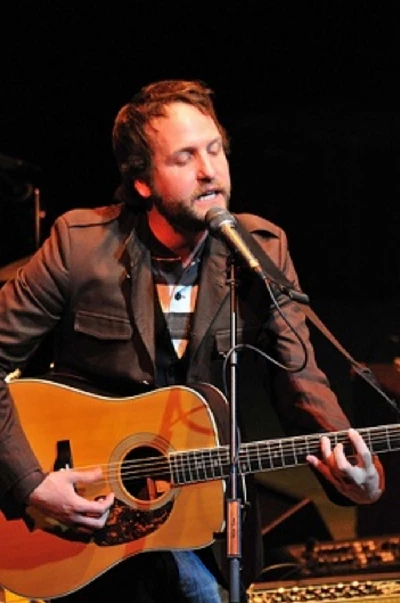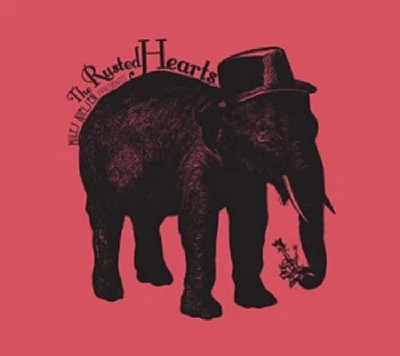published: 4 /
7 /
2012

Musician/songwriter Miles Nielsen, before performing a set with his group Rusted Hearts at Chicago's Northcenter Rib Fest, speaks with Lisa Torem about guest artists on his new album, its themes and his talented band mates
Article
Three years after his 2009 debut solo album, simply titled ‘Miles’, and now touring in support of his current band’s new release ‘Miles Nielsen “Presents The Rusted Hearts”’, Miles Nielsen ushers me to a quiet corner away from the burr of hawkers and locals. It’s Sunday night at the Chicago Northcenter Rib Fest where the band will compete for attention with addictive bacon-covered chocolate and a meat-eating extravaganza.
I spot Miles standing in back of his Sprinter. His band members already know my name and greet me like we’re old friends. Miles looks relaxed, is stylishly dressed and friendly. Once we meet up, he offers me a chance to chat either before or after the set. It turned out to be wise that we settled on “before” because afterwards he got busy greeting families, new fans and some from the old neighborhood. In fact, two such friends commented that they saw Miles play last time at the club “next to the Mexican restaurant where the burritos are the size of your head.” That’s quite an endorsement. Rumour has it that Miles Nielsen and The Rusted Hearts love to play and, to that end, they’ve covered a lot of ground these last couple of years
To another fan, I point out the stack of vinyl records on the merch table. He cracks a smile and whispers, “I want to show you something.” As he rolls up his sleeve, he exposes a tattoo of the legendary plastic disc (spider) that was used to keep 45s in place on a phonograph, back in Miles’s father, Cheap Trick guitarist Rick Nielsen’s day.
Miles is also a serious musician who embraces that past, as did his grandfather, but the musical family tree has branched out in different directions. His voice is infused with Randy Newman; his stories often have harrowing endings, and the harmonies that he and Dan McMahon feature bring to mind unlikely pairings, such as rough satin. Theirs is a unique sound that gets noticed by several swaying bodies at the foot of the stage.
There is a definite, slo-mo cinematic quality to their onstage performance, but every band member gets a chance to shine. McMahon plays a bluesy interpretation of George Harrison’s ‘Something’. The Rusted Hearts concentrate mostly on the original tunes from the two recent albums, so a cover has to be legendary to bust its way into this set list.
A couple of drunken dancers insist on blocking the stage, and even request some lounge lizard songs. Nielsen handles them with humour: “We’ll play those for you in the second set,” he smiles, knowing the fest will be closed down within the hour.
But random heckler aside, the urban sky is crystal clear, the midday humidity morphed into a reasonably cool night and the stars emit a velvet glow. The backstage area boasts a full keg of beer and the sexy scent of hickory smoke kicks off the music. Nielsen’s dark fedora, shades, crisp, white shirt and unbuttoned vest reflect the moon’s mellow presence.
The line-up consists of Andy Scarpaci (bass), Dan McMahon (guitar), Mickey Rosenquist (drummer), Darren Garvey (percussion) and Adam Plamann (woodwinds). Scarpaci explains that Plamann has to travel all the way from Appleton, Wisconsin to Rockford, Illinois (where the rest of the players reside) to rehearse with the band.
Finding time to get all the players together often poses a challenge, but their sound reveals none of the angst. Miles Nielsen and The Rusted Hearts have a sound that is tight, simultaneously progressive, old school and solid. Soon they’ll be packing up the van to take on the Texas heat and some more barbeque.
Miles discussed being raised by a tour bus, hopes of more recordings with The Rusted Hearts, and other recent projects with Pennyblackmusic.
PB: Your new album is great. I’d like to know which song describes your current state of mind.
MN: Current state of mind? That’s a good question. They all sum it up, but I’d probably say something along the lines of ‘The Grain’ because it kind of feels like it’s summertime. It has that upbeat, sunshiny melody thing to it, but it also has that sense of knowing that we’re heading out for the summer. It has a melancholy lyrical content to it.
Whenever you leave your home base for a couple of months, it’s a bittersweet thing You’re going to miss the people you are friends with, people that you love, and you’ve got to go out and you never know what that’s going to bring about with relationships.
PB: Have the last two years of intense touring affected the way you write?
MN: It’s given me a lot more time to travel and reflect on what we’re doing, which is good, but it also doesn’t leave you a whole lot of time to really hammer things out and ponder things and over think things. You get into a mindset, you click to it and then you document your feelings that day or that week so you get to it pretty quickly and then you get it out, so then it’s on to the next feeling, the next thing.
PB: It’s a very visceral album. You’ve got a guest artist, Coralie Towney.
MN: Yeah, Coralie. She’s got a beautiful voice. We met her through a friend, Duane Lundy at Shangri-La Studios who mixed the record and did some additional recording down in Lexington. I said, “We’re looking for a female to sing some parts. Do you know of anyone?”
He said, “I got this girl. She’s kind of got this Janis Joplin kind of feel.” And then she came in and showed up to the session with a forty-ounce Budweiser in a paper bag and it was probably two in the afternoon. She was smoking cigarettes and sitting on the hood of a car. I thought, “This is the girl,” and right out of the gate she just floored me.
She sang on ‘Dear Kentucky’ and then we said we had another song, so she also did the bridge on ‘Rusted Hearts.’ She did this two-part thing that was almost like this Eric Abadou, Lauryn Hill thing, which I wasn’t expecting. But she killed it – first take.
She did the first pass two or three times and then the second harmony she did it was one take. Wow. It’s good to find professionals around.
PB: I love the line, “Rusted hearts, like empty shopping carts.” Isn’t that what it comes down to: feeding each other’s bodies and souls, or then again, not being able to feed either one?
MN: The imagery to me was: How many times have you see that cart that was left behind somewhere, that was left behind somewhere to rust? It reminded me a lot of what a heart goes through that doesn’t have love, left and abandoned, without getting filled.
PB: ‘Cold War’ had a wise, and old feel, as if the story was about a grandson talking to his grandfather, even though the instrumentals and textures, in general, are contemporary.
MN: It’s actually me talking to my grandmother. She grew up in Germany and she married an American soldier, and that was the story of me sitting down, and talking to her. That’s her story about meeting my grandfather, who she then ended up divorcing after having three kids with him.
I realized through talking with her that the happiest times of her life were spent in Germany with bombs falling around her and being with her siblings. She moved out of Germany and she only went back to her homeland maybe three times in her whole life. So, to me, I thought, “How sad.”
The last line is: “I never thought that laughter would sound like bombs falling down.” That’s her telling me about how much fun she had as a child, but it was under Hitler’s reign so that’s an emotional one. I’ve ditched out on that song a couple of times after starting it, playing it at a club or a bar where people are loud and obnoxious. I’ve kind of just put a hold on it because I don’t want to give that one away. It means a little bit more to me than some of the other tunes. So I’m just going to pass for the sake of her.
PB: Yes, I can understand that you would do that out of respect. ‘Sirens’ reminds me of what you might hear during a Louisiana cakewalk. There’s a Zydeco feel too. Did you come up with that one through travelling?
MN: I think so. I think that’s from travelling, and I spent some time down in New Orleans, and I went to the jazz fest a few times and that feel always makes me smile. The line, “I was just waiting for a rainbow.” You’re just always waiting for that happiness.
PB: Adam Plamann is a fine soloist. He sounds like he walked out of a Benny Goodman movie.
MN: He’s a Sidney Bechet fan. He’s schooled in the art of really paying attention to those older guys that play clarinet. You don’t hear it in pop music too much. I feel like I really have an idea of how to incorporate that sound into our tunes to make it sound special for what we do.
PB: ‘All Time Loser’ is a study in loneliness and your voice really rises to the occasion. That song has a different vocal quality than the others.
MN: It’s about a stalker. There’s a line in the second verse that says, “This is an order of the restraining kind.” I just remember my dad being extremely popular in the late 1970s and 1980s, and there were people that were nuts. They would show up to the house and expect things from him: “I want you to come out here and tell me about your songs. You sing about dark things and evil things, you know.”
There was a guy who called in bomb threats to my folks’ car. These are things that you’re not expecting as a kid and it hits you when you’re much older in life. You put it together and go, “Whoa.”
I remember the bomb squad saying, “We’ve searched the car. We didn’t find a bomb. Why don’t you go in it and start it up?”
And my dad said, “Screw you. You get in there and start it up.” So they ended up starting it up and then the same guy ended up pounding about 100 steak knives into our porch while we were sleeping and then woke up. He ended up passing away, but he was a troubled guy who came back from Vietnam. He was a vet.
He was in bands in the Rockford area, where my dad grew up. He ended up going to war. My dad didn’t because he had a mild heart condition but he didn’t make the draft. So – weird folks.
PB: So growing up on Cheap Trick’s tour bus was not just fun and games. Your family faced some challenges.
MN: You learn things and see things that maybe as a kid you probably shouldn’t. You grow up pretty fast.
PB: I know you come from several generations of musicians. If you have a child, one day, would you want him to be brought up in this way – if you were on tour and you had to make that choice?
MN: Yeah. I think he always tried to shelter me from things the best he could. Ultimately the thing I realize is I always knew right from wrong, no matter what and you see people that party harder than usual. That’s pretty messed up. Then you think, I shouldn’t do that as a kid, or as an adult, as well.
PB: And you brother, Daxx, is also a musician.
MN: Yes, he’s the touring drummer for Cheap Trick right now so we’re keeping it in the family.
PB: You co-wrote the score for the film, ‘Undefeated’. How was that experience?
MN: It’s out now. The score is not, but the film is at theatres. It’s been out for a while. Daniel James, the other guitar player, and I, did the score. Adam did some playing on it. It was very charmed. All of a sudden, it’s up for an Academy Award, and, all of a sudden, it wins.
The whole process was just unexpected. We didn’t, obviously, know that anything like this was going to happen. We were only trying to get it done as best we could, and it turned out really great.
PB: Was the creative process a lot different than when you generally sit down to write?
MN: Absolutely. The big difference is that there are no lyrics. You’re not holding on to lines and words and holding on to songs so dearly. They’re more instrumental pieces so you’re really trying to convey a mood, rather than saying something.
PB: Back to the album. While recording in the dead of winter, according to one of your online videos, drummer Mickey Rosenquist used a snow shovel on a percussion track.
MN: (Laughs). That may or may not be true, but we are a sarcastic bunch.
PB: You can never be too prepared in a blizzard.
MN: You’ve got to have a shovel. You’ve got to have salt, all of those things. We chose to record in the winter because travelling in winter can be sort of sketchy. We really wanted to lock into the studio for a while. We were all in the right frame of mind. We had some wine to keep us warm too.
PB: When you write, what comes first: the story or the sound?
MN: Typically, the story. That usually drives the sound. You have an idea and that needs to say a certain thing and you want it to sound a certain way and feel a certain way. It’s pretty much the story driving the music.
PB: The band has been compared to artists like Dylan, Springsteen and the Beatles. Any reaction?
MN: Wow. It’s nice. That’s flattering. I think we have a long ways to go, but that’s good company to keep if that’s who they’re comparing us to. Clearly I’ve studied those guys and paid attention to what they do, but that’s pretty lofty.
I would say, more along the lines of trying to write as well as a Jeff Tweedy or M Ward, but I’m a huge fan of all those guys, sure.
PB: You’re going on tour with the Bo Deans.
MN: We’re going to go out with them for about three weeks this summer. Prior to that we’re going out south with a band called Drivin’ N’ Cryin and I’m a big fan of that band. We played a gig with not too long ago. We just hit it off and said we would love to bring you down.
PB: As far as your recording career, are you looking for major label attention?
MN: I think if they’re interested in us, let’s talk. If it’s the right thing, then it might make sense, but if not, I’m not hung up on labels, really. I’m just trying to make music.
PB: What’s the weirdest thing that’s ever happened to you, onstage, or maybe it hasn’t happened yet…
MN: Maybe not, I don’t know. I ran into a girl I had gone to high school with. She sat there and bashed me at the bar, not knowing it was me for about twenty minutes and then I went up onstage.
She ran up to the front of the stage, gave me the double bird, screamed and then ran off. So that was pretty weird. That was a good time. It made me feel good about high school.
PB: So what’s in the future for The Rusted Hearts?
MN: We want to do a lot of shows, a lot of songs. We’re really trying to record as much as we can. Over the last year or year and a half, we became really tight just being in a band and travelling as a band together. The more we can do that, the more we’re going to grow. We’re just trying to grow.
I know a lot of artists who hire different people for every record. I’d like to keep the same guys just because I feel we’re on to something.
PB: There’s a lot of camaraderie between you. I know you’re getting ready to play, Miles. One last question: If you could live in a different era, which one would it be?
MN: Probably the late 1960s. Maybe the 1950s. It just felt new and they were creating such new sounds. That would be amazing to me. The appreciation for live music was just so strong. Those times felt so special to me, and it still does - when I listen to the recordings, it seems undeniable.
PB: Thank you.
Band Links:-
https://www.facebook.com/milesnielsenm
http://www.milesnielsen.com/
https://twitter.com/TheRustedHearts
https://www.instagram.com/therustedhea
Picture Gallery:-

